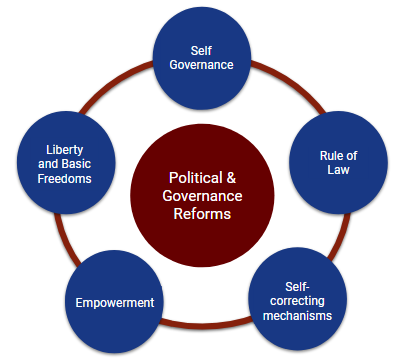About FDR
Foundation for Democratic Reforms (FDR) is among India’s leading think-tanks and research-resource centres for studying, formulating and promoting fundamental reforms in political, electoral and governance spheres, along with critical areas of state and public policy. Our objective is to promote holistic, peaceful and democratic transformation of the Indian polity, by creating a suitable environment for the democratic functioning of all institutions of governance. Established in 1996 and based in Hyderabad, Telangana, the Foundation for Democratic Reforms was founded by Dr. Jayaprakash Narayan, our Founder-General Secretary. He is a former MLA, bureaucrat and former member of National Advisory Council and Second Administrative Reforms Commission.
Research and Advocacy are the two core branches of work at FDR. We undertake extensive research and analysis in respect of our Focus Areas to formulate policy recommendations that are suited to Indian needs and circumstances. FDR’s advocacy efforts seek to leverage the power of the context, by promoting systemic reforms at the opportune time. The advocacy is two-pronged – engaging with the decision makers on specific policy recommendations and shaping public opinion through social media. FDR has played a critical role in bringing about several notable policy reforms such as the Right to Information Act, 2005, the Lokpal and Lokayuktas Act, 2013, and the National Judicial Appointments Commission through the 99th Constitutional Amendment. The Research & Development division of Foundation for Democratic Reforms is recognized by the Department of Scientific & Industrial Research (DSIR), Ministry of Science & Technology, Government of India.
FDR’s Guiding Principles
The state in the modern world has a vital role in facilitating the fulfilment of all human potential and in eliminating all avoidable suffering. There are five key ingredients of being a true democracy that are instrumental in achieving those twin goals.

These five elements are the pillars of the core agenda of FDR. As Dr. Narayan argues, India falls short in all five respects in a myriad of ways – asymmetry of power between the governing elite and the people, poor service delivery, weak rule of law, centralisation, money power in politics, autocratic political parties and poor education and health care. The work at FDR is geared towards addressing these systemic challenges to make our democracy deliver better.

